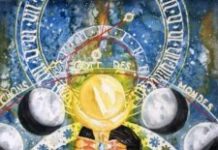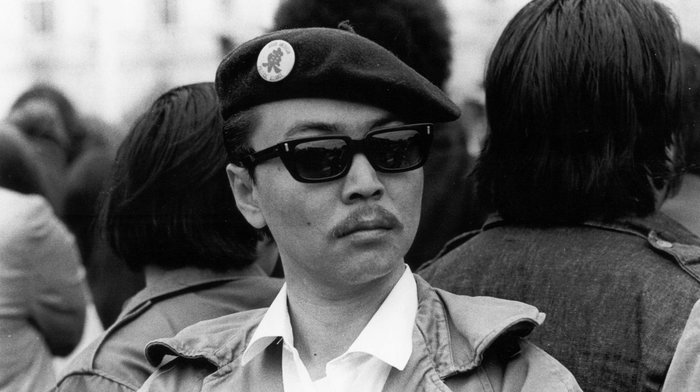
Richard Aoki was known as the “minister of education” for the Berkeley, Calif., chapter of the Black Panther Party.
The man who gave the Black Panther Party some of its first firearms and weapons training – which preceded fatal shootouts with Oakland police in the turbulent 1960s – was an undercover FBI informer, according to a former bureau agent and an FBI report.
One of the Bay Area’s most prominent radical activists of the era, Richard Masato Aoki was known as a fierce militant who touted his street-fighting abilities. He was a member of several radical groups before joining and arming the Panthers, whose members received international notoriety for brandishing weapons during patrols of the Oakland police and a protest at the state Legislature.
Aoki went on to work for 25 years as a teacher, counselor and administrator at the Peralta Community College District, and after his suicide in 2009, he was revered as a fearless radical.
But unbeknownst to his fellow activists, Aoki had served as an FBI intelligence informant, covertly filing reports on a wide range of Bay Area political groups, according to the bureau agent who recruited him.
That agent, Burney Threadgill Jr., recalled that he approached Aoki in the late 1950s, about the time Aoki was graduating from Berkeley High School. He asked Aoki if he would join left-wing groups and report to the FBI.
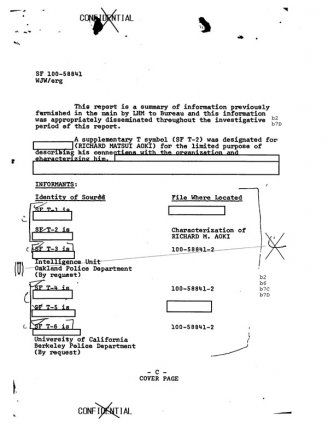
A document from Aoki’s redacted FBI file
“He was my informant. I developed him,” Threadgill said in an interview. “He was one of the best sources we had.”
The former agent said he asked Aoki how he felt about the Soviet Union, and the young man replied that he had no interest in communism.
“I said, ‘Well, why don’t you just go to some of the meetings and tell me who’s there and what they talked about?’ Very pleasant little guy. He always wore dark glasses,” Threadgill recalled.
Aoki’s work for the FBI, which has never been reported, was uncovered and verified during research for the book, “Subversives: The FBI’s War on Student Radicals, and Reagan’s Rise to Power.” The book, based on research spanning three decades, will be published tomorrow by Farrar, Straus and Giroux.
In a tape-recorded interview for the book in 2007, two years before he committed suicide, Aoki was asked if he had been an FBI informant. Aoki’s first response was a long silence. He then replied, “ ‘Oh,’ is all I can say.”
Later during the same interview, Aoki contended the information wasn’t true.
Asked if this reporter was mistaken that Aoki had been an informant, Aoki said, “I think you are,” but added: “People change. It is complex. Layer upon layer.”
However, the FBI later released records about Aoki in response to a Freedom of Information Act request. A Nov. 16, 1967, intelligence report on the Black Panthers lists Aoki as an “informant” with the code number “T-2.”
An FBI spokesman declined to comment on Aoki, citing litigation seeking additional records about him under the Freedom of Information Act.
Since his death – Aoki shot himself at his Berkeley home after a long illness – his legend has grown. In a 2009 feature-length documentary film, “Aoki,” and a 2012 biography, “Samurai Among Panthers,” he is portrayed as a militant radical leader. Neither mentions that he had worked with the FBI.
Harvey Dong, who was a fellow activist and close friend, said last week that he had never heard that Aoki was an informant.
“It’s definitely something that is shocking to hear,” said Dong, who was the executor of Aoki’s estate. “I mean, that’s a big surprise to me.”
Dong recalled that Aoki tended to “compartmentalize” the different parts of his life. Before he shot himself, Dong said, Aoki had laid out in his apartment two neatly pressed uniforms: One was the black leather jacket, beret and dark trousers of the Black Panthers. The other was his U.S. Army regimental.
In Berkeley in the late 1960s, Aoki wore slicked-back hair, sported sunglasses even at night and spoke with a ghetto patois. His fierce demeanor intimidated even his fellow radicals, several of them have said.
“He had swagger up to the moon,” former Berkeley activist Victoria Wong recalled at his memorial.
From gangs to the military
Aoki was born in San Leandro in 1938, the first of two sons. He was 4 when his family was interned at Topaz, Utah, with thousands of other Japanese Americans during World War II.
After the war, Aoki grew up in West Oakland, in an area that had been known as Little Yokohama before becoming a low-income black community. He joined a gang and became a tough street fighter who as an adult would boast, “I was the baddest Oriental come out of West Oakland.”
He shoplifted, burgled homes and stole car parts for “the midnight auto supply business,” he told Berkeley’s KPFA radio in a 2006 interview. Oakland police repeatedly arrested him for “mostly petty-type stuff,” he said in the 2007 interview. Still, he graduated from Herbert Hoover Junior High School as co-valedictorian.
But the internment during World War II had shattered his family, Aoki had said. His father became a gangster and abandoned his family, and his mother won custody of her sons and moved them to Berkeley. Aoki did well academically at Berkeley High School and became president of the Stamp and Coin Club. However, he assaulted another student in the hallway and, as he recalled, “beat him half to death.”
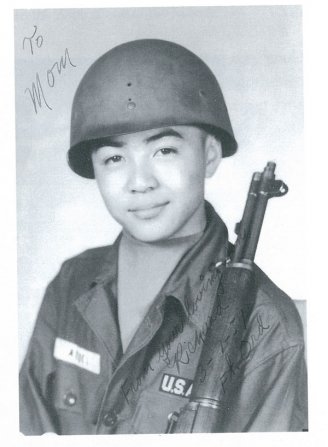
A picture from Aoki’s military days
Three days after graduating from high school in January 1957, Aoki reported for duty at Fort Ord, near Monterey. He had enlisted in the U.S. Army the prior year, at age 17. He acknowledged in the 2007 interview that he had “cut a deal” in which military authorities arranged for his criminal record to be sealed.
Aoki said he had hoped to become the army’s first Asian American general, but he served only about a year on active duty and seven more in the reserves before being honorably discharged as a sergeant.
Although he saw no combat, he became a firearms expert. “I got to play with all the toys I wanted to play with when I was growing up,” he told KPFA. “Pistols, rifles, machine guns, mortars, rocket launchers.”
Being in the reserves left Aoki a lot of free time, and he became deeply involved in left-wing political organizations at the behest of the FBI, retired FBI agent Threadgill said during a series of interviews before his death in 2005.
“The activities that he got involved in was because of us using him as an informant,” he said.
Threadgill recalled that he first approached Aoki after a bureau wiretap on the home phone of Saul and Billie Wachter, local members of the Communist Party, picked up Aoki talking to fellow Berkeley High classmate Doug Wachter.
At first, Aoki gathered information about the Communist Party, Threadgill said. But Aoki soon focused on the Socialist Workers Party and its youth affiliate, the Young Socialist Alliance, also targets of an intensive FBI domestic security investigation.
By spring 1962, Aoki had been elected to the Berkeley Young Socialist Alliance’s executive council, FBI records show. That December, he became a member of the Oakland-Berkeley branch of the Socialist Workers Party, where he served as the representative to Bay Area civil rights groups. He also was on the steering committee of the Committee to Uphold the Right to Travel.
In 1965, Aoki joined the Vietnam Day Committee, an influential anti-war group based in Berkeley, and worked on its international committee as liaison to foreign anti-war activists.
All along, Aoki met regularly with his FBI handler. Aoki also filed reports by phone, Threadgill said.
“I’d call him and say, ‘When do you want to get together?’ ” Threadgill recalled. “I’d say, ‘I’ll meet you on the street corner at so-and-so and so on.’ I would park a couple of blocks away and get out and go and sit down and talk to him.”
Arming the Black Panthers
Threadgill worked with Aoki through mid-1965, when he moved to another FBI office and turned Aoki over to a fellow agent. Aoki was well positioned to inform on a wide range of political activists.
Aoki attended Merritt College in Oakland, where he met Huey Newton, a pre-law student, and Bobby Seale, an engineering student, who were in a political group called the Soul Students Advisory Council.
In fall 1966, Aoki transferred to UC Berkeley as a junior in sociology. That October, Seale and Newton took a draft of their 10-point program for what would become the Black Panther Party for Self-Defense to Aoki’s Berkeley apartment and discussed it over drinks. The platform called for improved housing, education, full employment, the release of incarcerated black men, a halt to “the robbery by the capitalists of our black community” and an “immediate end to police brutality.”
Soon after, Aoki gave the Panthers some of their first guns. As Seale recalled in his memoir, “Seize the Time:”
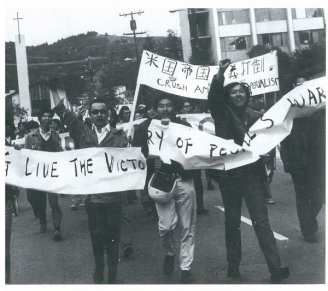
Aoki seen far left
“Late in November 1966, we went to a Third World brother we knew, a Japanese radical cat. He had guns … .357 Magnums, 22’s, 9mm’s, what have you. … We told him that if he was a real revolutionary he better go on and give them up to us because we needed them now to begin educating the people to wage a revolutionary struggle. So he gave us an M-1 and a 9mm.”
In early 1967, Aoki joined the Black Panther Party and gave them more guns, Seale wrote. Aoki also gave Panther recruits weapons training, he said in the 2007 interview.
“I had a little collection, and Bobby and Huey knew about it, and so when the party was formed, I decided to turn it over to the group,” Aoki said in the interview. “And so when you see the guys out there marching and everything, I’m somewhat responsible for the military slant to the organization’s public image.”
In early 1967, the Panthers displayed guns during their “community patrols” of Oakland police and also that May 2, when they visited the state Legislature to protest a bill.
Although carrying weapons was legal at the time, there is little doubt their presence contributed to fatal confrontations between the Panthers and the police.
On Oct. 28, 1967, Newton was in a shootout that wounded Oakland Officer Herbert Heanes and killed Officer John Frey. On April 6, 1968, Eldridge Cleaver and five other Panthers were involved in a firefight with Oakland police. Cleaver and two officers were wounded, and Panther Bobby Hutton was killed.
During the period Aoki was arming the Panthers, he also was informing for the FBI. The FBI report that lists him as informant T-2 says that in May 1967, he reported on the Panthers.
None of the released FBI reports mention that Aoki gave guns to the Panthers.
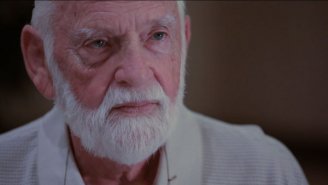
Wes Swearingen FBI counterintelligence agent
FBI’s reliance on informants
M. Wesley Swearingen, a retired FBI agent who has criticized unlawful bureau surveillance activities under the late Director J. Edgar Hoover, reviewed some of the FBI’s records. He concluded in a sworn declaration – filed in a Freedom of Information Act lawsuit seeking records on Aoki – that Aoki had been an informant.
Swearingen served in the FBI from 1951 to 1977, and worked on a squad that investigated the Panthers.
“Someone like Aoki is perfect to be in a Black Panther Party, because I understand he is Japanese,” he said. “Hey, nobody is going to guess – he’s in the Black Panther Party; nobody is going to guess that he might be an informant.”
Swearingen also said the FBI certainly must have additional records concerning Aoki, including special informant files.
“Aoki wouldn’t even have to be a member of the party. If he just knew Huey Newton and Bobby Seale, if he went out to lunch with them every day, they would have a main file,” he said. “But to say they don’t have a main file is ludicrous.”
In the 1990s, testimony from Swearingen helped to vacate the murder conviction of Elmer “Geronimo” Pratt, a Black Panther leader in Los Angeles. Evidence showed that the FBI and Los Angeles Police Department had failed to disclose that a key witness against Pratt was a longtime FBI informant named Julius C. Butler. Pratt later won a civil suit for wrongful imprisonment, with the City of Los Angeles paying Pratt $2.75 million and the FBI paying him $1.75 million.
During the late ’60s and early ’70s, the FBI sought to disrupt and “neutralize” the Black Panthers under COINTELPRO, the bureau’s secret counterintelligence program to stifle dissent, according to reports by the U.S. Senate Select Committee to Study Government Operations with Respect to Intelligence Activities.
As part of COINTELPRO, the committee found, the FBI used informants to gather intelligence leading to the weapons arrests of Panthers in Chicago, Detroit, San Diego and Washington. By the end of 1969, at least 28 Panthers had been killed in gunfights with police and many more arrested on weapons charges, according to news accounts.
Hoover declared in late 1968 that the Panthers, who by now had chapters across the nation, posed “the greatest threat to the internal security of the country.” He cited their radical philosophy and armed confrontations with police.
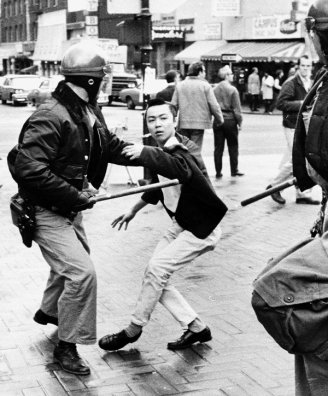
Aoki in an 1969 protest
Although Aoki later would boast of his role with the Panthers, he was secretive about his relations with them at the time, explaining in the 2007 interview that he feared being expelled from UC Berkeley if his activities were known.
In early 1969, Aoki emerged as a leader of the Third World Liberation Front strike at UC Berkeley, which demanded more ethnic studies courses. He advocated violent tactics, according to interviews with him and Manuel Delgado, another strike leader.
Scores of students and police were injured during the three-month confrontation, which became the campus’s most violent strike to date. Gov. Ronald Reagan declared a state of emergency and sent the National Guard to quell the violence.
At a memorial service for Aoki at Wheeler Hall in May 2009, Seale, of the Black Panthers, and other activists hailed Aoki as a “fearless leader and servant of the people.” In a phone conversation last week, Seale expressed surprise at hearing that Aoki was an informant and declined to comment further.
Seth Rosenfeld was an investigative reporter for the San Francisco Examiner and San Francisco Chronicle and has won the George Polk Award and other journalism honors. He can be reached at seth@sethrosenfeld.com. This story was edited by Robert Salladay and copy edited by Nikki Frick.
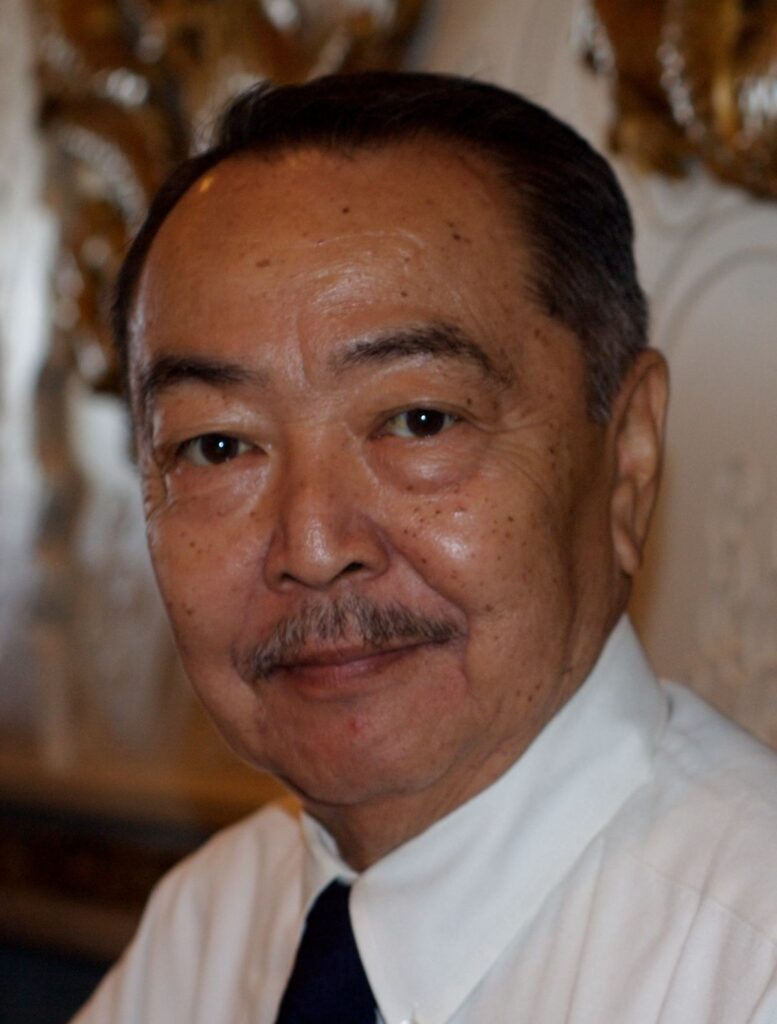
Aoki in his older years
SOURCES
https://www.npr.org/2012/10/03/161408561/did-man-who-armed-black-panthers-lead-two-lives
Link To Aoki’s FBI File
https://s3.amazonaws.com/s3.documentcloud.org/documents/447474/10191101-aoki-doc-one.pdf
Social Media Links
YouTube kabaibatunre
https://www.youtube.com/user/KaBaIbAtunRe
Instagram redpillgang99







